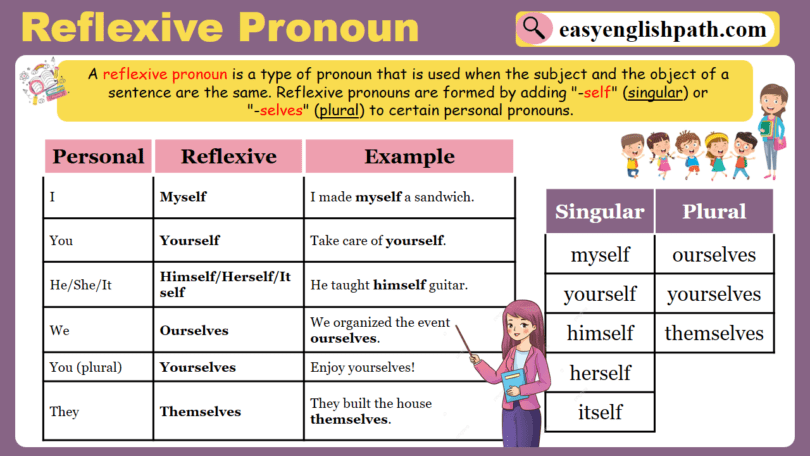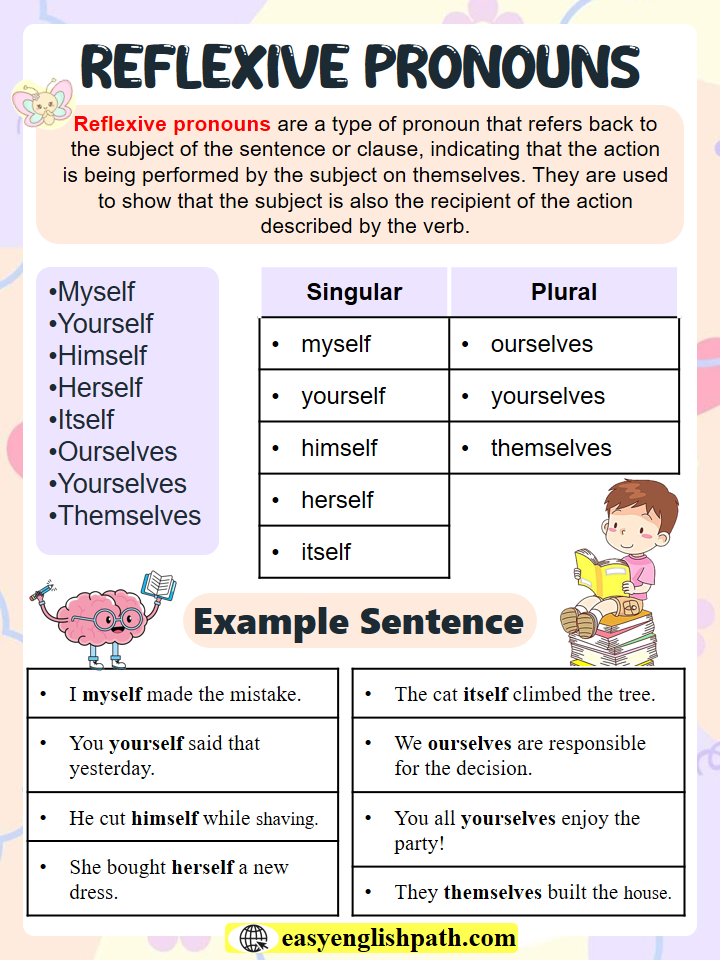Reflexive pronouns are words like myself, yourself, himself, and herself. They show actions that a person does to themselves or for themselves. These pronouns can help us tp talk about doing things alone or any without help.
What are Reflexive Pronouns?
A reflexive pronoun is a pronoun that is used as an object and refers to the same person or thing as the subject. These pronouns are very important for indicating actions where the subject and object are the same entity.
- I saw myself in the mirror.
- The baby fed itself with a spoon.
- They taught themselves how to swim.
- She hurt herself while running.
Rules of Reflexive Pronouns
Reflexive pronouns are used when the subject and the object of a sentence are the same person or thing. These pronouns end in -self (for singular) or -selves (for plural).
1. Action Reflected Back to the Subject
When someone does something to themselves, we use reflexive pronouns.
- He injured himself while playing soccer.
- She saw herself in the mirror and smiled.
2. Emphasizing the subject’s action
Reflexive pronouns are also used for emphasis, to show that the subject did the action alone or without help.
- She solved the puzzle herself.
- He cleaned the entire house himself.
3. Avoiding confusion
Reflexive pronouns make the meaning of the sentence clear when the subject and object are the same.
- He saw himself in the mirror.
- She wrote a letter to herself.
4. Showing mutual actions (Reciprocal use)
Sometimes, reflexive pronouns like each other show that people are doing something to one another.
- They hugged each other tightly.
- We helped each other with our homework.
Reflexive Pronouns as Intensive Pronouns
| Feature | Reflexive Pronouns | Intensive Pronouns |
|---|---|---|
| Purpose | Reflects the action back to the subject | Emphasizes the subject or noun |
| Function in Sentence | Acts as an object of the verb or preposition | Adds emphasis, not necessary for sentence meaning |
| Can be removed? | ❌ No – sentence becomes incorrect or unclear without it | ✅ Yes – sentence still makes sense without it |
| Position in Sentence | Usually comes after the verb or preposition | Usually comes right after the subject/noun or at the end for emphasis |
| Examples | He hurt himself. She blamed herself for the mistake. | I myself finished the project. The president himself made the speech |
List of Reflexive Pronouns
- Myself
- Yourself
- Himself
- Herself
- Itself
- Ourselves
- Yourselves
- Themselves
Example Sentences with Reflexive Pronouns
- I made the cake myself.
- She completed the assignment herself.
- He fixed the car himself.
- The cat cleaned itself.
- We decorated the house ourselves.
- You should prepare for the exam yourself.
- They organized the event themselves.
- She taught herself to play the piano.
- The children entertained themselves during the trip.
- I treated myself to a nice dinner.
You May Also Like






